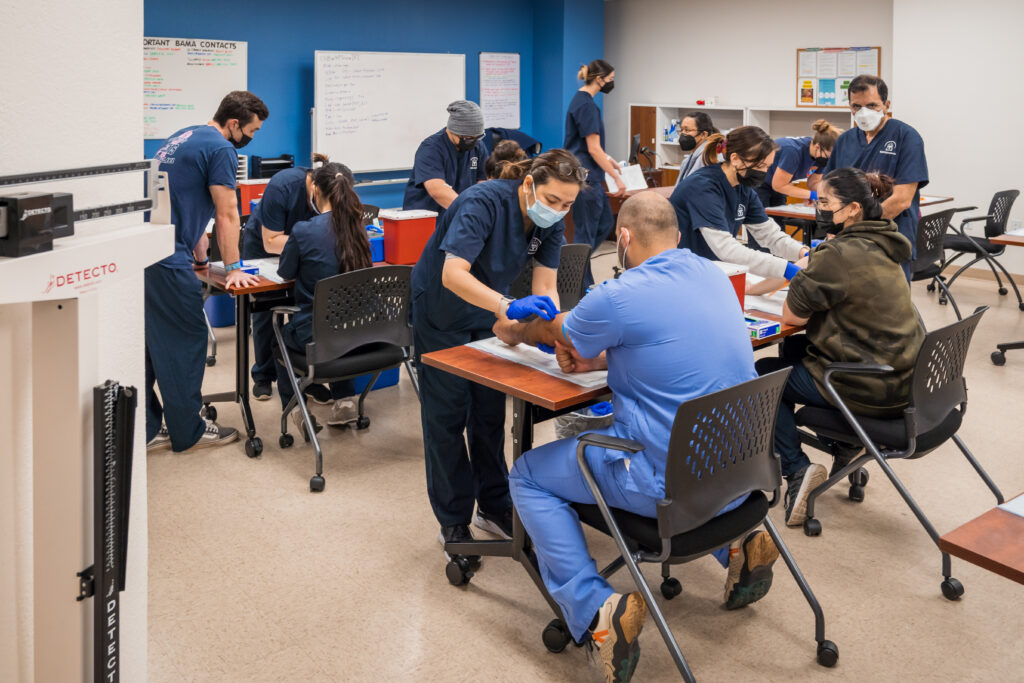Class Calendar | Call admissions on 415-943-2028
Find Phlebotomy Technician and EKG Technician training at BAMA Institute
Are You Eligible For Our Free Medical Assisting With Phlebotomy & EKG Program For SF Residents? CLICK HERE.
Class Calendar | Call admissions on 415-943-2028

Healthcare is a massive and diverse employment market. There are hundreds of entry-level healthcare training programs available that will promise you a foot in the door. Unfortunately, many of those operations don’t provide any certifications, leaving you with no skills or stuck in a low-paying job with little hope of advancement. To choose the right path, consider the healthcare training programs that prepare you for in-demand positions like medical assisting, phlebotomy, and EKG technician.
While many entry-level healthcare positions are available, not all are exceptionally high-paying. The jobs with no training requirements may pay a little bit more than minimum wage, with long hours and high stress. If you want to enter healthcare for the first time, you’re better off choosing an in-demand position that will maximize your salary.
You could consider three certifications: Medical assistant, phlebotomist, and EKG technician. They boast relatively high starting salaries, short training, and diverse and exciting job duties.
| Medical Assistant (Est salary: $46K – $64K) | Phlebotomist (Est salary: $39K – $59K ) | EKG Tech (Est salary: $46K – $61K) | |
|---|---|---|---|
| Description: | This position is found in hospitals, laboratories, or medical provider’s offices. Some of the duties of a medical assistant include:
| A phlebotomist’s duties will vary based on whether their position is in a lab or patient-facing. A few everyday tasks include
|
An EKG tech monitors a patient’s heart using an electrocardiogram to help diagnose conditions. Common duties include:
|
| Requirements: | There is no state certification requirement, though most employers will require you to attend a program that meets California Medical Board standards and pass a national certification exam. | A CPT-1, or Certified Phlebotomy Technician 1 license is required to draw blood from patients in California. | Like medical assisting, the state does not require EKG certification but most employers and their malpractice insurance will need it. |
To be a certified medical assistant in California, you must attend a program approved by the state’s Medical Board. You will also have to pass a certification exam from an approved organization. Accredited, reputable programs typically require nine months to a year of training.
There are three main career pathways for medical assistants: Clinical, Administrative, and Specialized.
As you gain experience in your medical assistant position, you can advance to higher-up positions. You may even wind up managing a medical team or training the next generation of healthcare workers.
If you want to work in phlebotomy, you’ll need a Certified Phlebotomy Technician 1 license. Of course, it’s not as easy as just applying. You’ll need to attend an approved phlebotomy training program and take a certification exam from one of six agencies:
While many programs promise to accelerate training, the most reputable are usually around three to six months long. Phlebotomy career pathways typically break down to laboratory, patient-focused and supervisor roles:
Entry-level positions in each category lay the foundation for your career, but advancement is possible. For example, starting as a mobile phlebotomist can lead to roles like a lab director or medical lab scientist. Requirements and salaries vary, but obtaining a CPT-1 from a reputable school can open doors to a very rewarding career.
There is no formal certification process to be an EKG tech in California. However, it is very likely a requirement for any employer hiring techs, as their malpractice insurance will almost certainly mandate it. Otherwise, the risk that an EKG tech could perform tests incorrectly, leading to inaccurate diagnoses, is far too high.
Most healthcare providers hiring for an EKG tech will require that the individual graduate from an accredited healthcare training school. EKG isn’t usually a standalone career, though it can be. Typically, our students obtain it as a supplemental skill to take on more responsibilities and earn higher pay.
The ones who want to increase their potential the most through healthcare training programs take our three-in-one medical assisting with phlebotomy program. With it, they earn their certified medical assistant, phlebotomy, and EKG credentials, opening doors to a variety of exciting career opportunities in the healthcare field. Students also have the option of attending BAMA Institute’s standalone EKG technician and phlebotomy courses if they’d like to focus on specific credentials.
Bay Area Medical Academy offers the top healthcare training programs trusted by Bay Area employers. To learn more, reach out to an admissions representative. .
"*" indicates required fields
Our career-oriented program gives you hands-on, real-world training and ongoing support for your long-term goals.
For more information on BAMA's medical assisting and phlebotomy degree programs, contact us today!
BAMA: The Bay Area's best career-oriented healthcare traning
© 2024 Bay Area Medical Academy. All Rights Reserved. Website by WindsAndWater